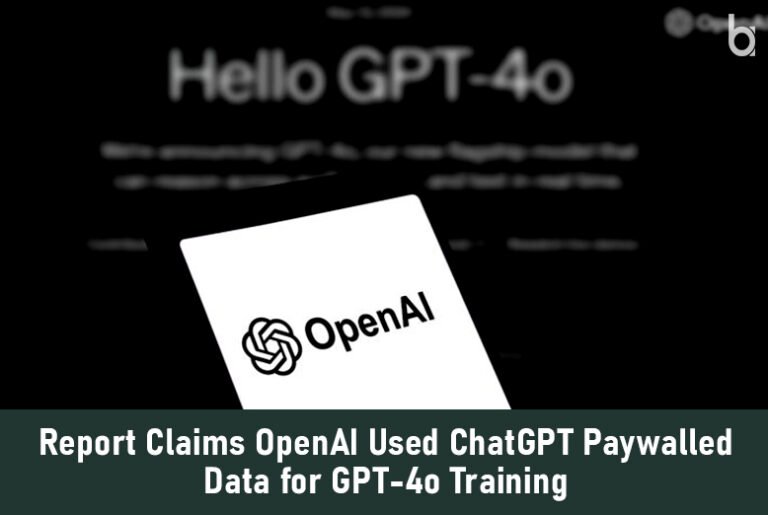Business APAC
4th April 2025
Report Claims OpenAI Used ChatGPT Paywalled Data for GPT-4o Training
A new report alleges that OpenAI, the research lab famous for ChatGPT, used information from behind subscription paywalls to help train its latest powerful AI model, GPT-4o. If true, this claim brings back major questions about how AI companies gather data and whether they respect the rights of content creators who charge for their work, especially concerning ChatGPT paywalled data usage.
What does “paywalled content” mean?
Paywalled content refers to online material, such as articles, videos, or other information, that is only accessible to users who have paid a subscription fee or a one-time payment to view it. It’s like putting a digital “wall” around the content that requires payment to pass through, raising concerns about ChatGPT paywalled data access.
The Allegations Surface Again
The report, released earlier this week, suggests that protected content requiring paid subscriptions was part of the massive dataset used to teach GPT-4o. While the report doesn’t detail precisely how OpenAI might have obtained this data, it indicates that materials not freely available on the public internet were included in the training process, potentially impacting the ChatGPT paywalled data landscape. This could include news articles, academic journals, or other specialized content usually restricted to paying subscribers.
An Ongoing Debate Over Training Data
This is not the first time OpenAI and other AI developers have faced accusations about their data sources. For the past couple of years, there has been growing controversy and legal action surrounding the use of copyrighted materials to train large language models.
Several major publishers, including The New York Times, as well as groups representing authors and artists, have filed lawsuits against AI companies, specifically regarding the use of ChatGPT paywalled data and similar content. They argue that using their work without permission or payment to build profitable AI tools violates copyright laws.
OpenAI’s Position
OpenAI has not yet issued a specific public statement responding directly to this latest report concerning GPT-4o and paywalled data. Generally, the company has maintained that it trains its models on a broad mix of data, including publicly accessible information from the internet and data licensed through partnerships.
OpenAI has sometimes pointed to legal concepts like ‘fair use’ to defend its practices and has implemented ways for websites to block its web crawlers. However, critics argue these measures don’t adequately address the use of copyrighted or ChatGPT paywalled data.
Why This Issue Matters
The question of where AI training data comes from is crucial for several reasons:
- Fairness: Publishers and creators argue it’s unfair for AI companies to benefit from content they invest time and money into producing, especially if it’s behind a paywall, raising questions about the ethics of using ChatGPT paywalled data.
- Legality: Using copyrighted or restricted data without permission could lead to costly lawsuits and legal rulings against AI firms, particularly concerning the use of ChatGPT paywalled data.
- Transparency: Users and regulators increasingly want to know how AI models are built and what information they are trained on, including the use of ChatGPT paywalled data.
- Future Rules: This ongoing conflict is likely to influence new laws and regulations governing artificial intelligence development worldwide, potentially impacting the future of ChatGPT paywalled data usage.
Why This News is Important: 5 Key Takeaways
Here are some key reasons why this report about OpenAI and paywalled data matters:
- If the AI used paywalled stuff, it might learn to do things better because that information is often really good. But if they weren’t supposed to use it or didn’t get all of it, the AI could also end up with wrong ideas or biases, especially concerning ChatGPT paywalled data.
- There are lots of lawsuits happening about using copyrighted work to train AI. What happens in these cases will change the rules about what AI companies can and can’t use, including ChatGPT paywalled data.
- Even if the law says OpenAI didn’t do anything wrong, some people think it’s not fair to use the work of others who put in time and money, especially if they charge for it, in the context of ChatGPT paywalled data.
- More and more, people want to know what kind of information AI models use. This helps them trust the AI and see if it might have learned bad things or broken any rules, particularly regarding ChatGPT paywalled data. It also makes people wonder how easy it is to check all that data.
- Because of this problem, AI companies might have to find different ways to get the information they need, like paying for it or making their own. This could mean new ways for people who create content to get paid when AI uses their work, especially concerning ChatGPT paywalled data.
Conclusion
This new report focusing on GPT-4o adds more complexity to the already heated discussion about AI training data. It underlines the continuing tension between the rapid advancement of AI technology and the established rights of content creators and publishers.
Finding a balance that is both legal and ethical remains a significant challenge for the entire AI industry, particularly with ChatGPT paywalled data.
Also Read: India and Chile’s CEPA on Critical Minerals: Who Wins?



